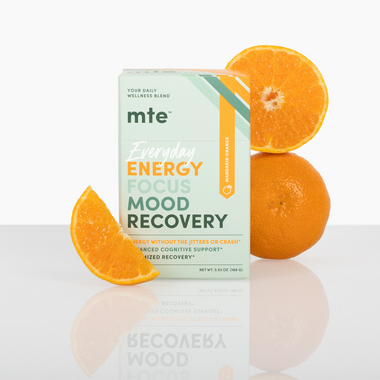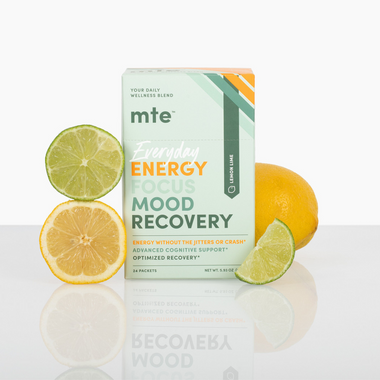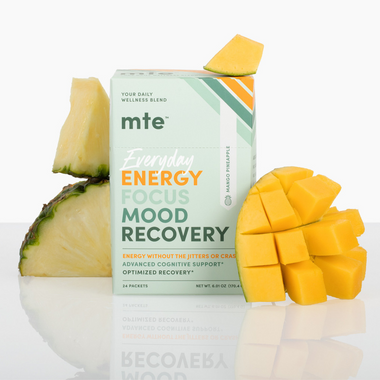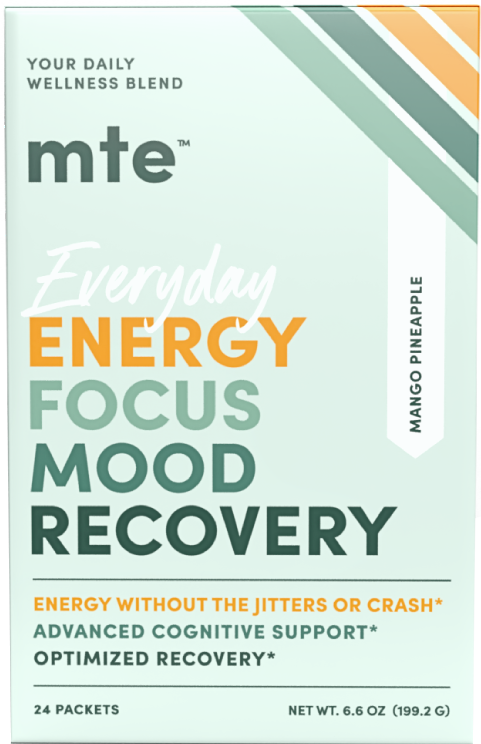
The Gut-Brain Connection: Is Your Gut Really a Second Brain?
With the rise of focus on gut health in the wellness and supplement industry, you’ve probably heard the term “gut-brain connection” or “gut-brain axis”. The digestive system is even colloquially referred to as a “second brain”. Probiotics, greens powders, supplements, and other products promise to streamline digestive health, claiming it will positively affect your mood, cognitive function and physical condition. But is it true?
Yes. But it’s a little messy, and there’s a lot to digest. Like that pun…
What’s Going On in Your Gut?
So, besides the gross magician’s ribbon of intestines crammed inside your body cavity, what’s your gut really made of? Hint: still gross:
The Pregame
Digestion starts in your esophagus, but the real work starts in the small intestine, after your stomache breaks down whatever you just ate into a disgusting acidic broth called chyme.
The Absorption
The small intestine is lined with villi – creepy finger-like projections that absorb all the delicious nutrients from the chyme. It's like a microscopic buffet where your body picks and chooses its favorites.
The Breakdown
Your gut is teeming with trillions of microorganisms which comprise what we call the gut’s microbiome. These bacteria, fungi and other microbes do the work of breaking down complex sugars.
The Production Line
The gut uses the raw materials it’s extracted from the nutrients your small intestine picked out to produce vitamins your body needs. It's a bustling ecosystem where every single micro-creature has a role to play.
The Recycling Center
After all the good stuff is scavenged out of the chyme, the remaining stuff travels to your large intestine, which absorbs the remaining water and electrolytes before the leftovers proceed to the bathroom places.
How Does Digestive Function Affect the Brain?
Okay, now let’s bring the discussion of digestion back up – all the way up and into the brain. What is the connection? Two things:
Diverse Bacteria Populations
Like we said – there are literally trillions of little workers representing hundreds of bacterial species that make the digestive system work. But they also send signals to the brain, mainly through the vagus nerve, a major communication pathway, influencing our physical and mental state.
Diversity is key in a healthy microbiome. Good bacteria like Lactobacillus and Bifidobacterium help digest food, producing vitamins and supporting your immune system. Others – the bad guys – can contribute to inflammation and gut issues. But there's also a third group – the opportunists – who can swing one way or another depending on the environment.
An Autonomous Nervous System
No, not the autonomic nervous system. This is a fourth nervous system separate from the CNS, ANS and PNS. The gut’s nervous system is called the enteric nervous system (ENS). It contains millions of neurons that create signals that mimic neurotransmitters. While connected to the central nervous system, the ENS has some autonomy, regulating digestion, gut motility and even some immune responses.
This bidirectional communication network between the gut and brain allows them to influence each other, impacting everything from digestion and nutrient absorption to mood, stress levels, and even cognitive function.
Where’s the Clinical Evidence for This Mysterious Shadow Brain?
Now for the science-y part. What does the research say about this gut-brain axis? We’re going to ignore the part where much of the research involves analyzing fecal matter at close proximity…
A 2018 review of the literature on microbiome, mood and mental health cited several compelling human studies, including:
- 2002: A study on adults suffering from stress-induced exhaustion found that L acidophilus, B bifidum and B longum supplements improved subjects’ general condition by 40.7% after 6 months.
- 2007: A study on the effects of probiotic yogurt found that subjects who started with a low mood reported mood improvements.
- 2009: A study on adults with chronic fatigue found that 2 months of supplementing with L casei significantly improved Beck scores on an inventory used to evaluate stress and reactivity.
- 2011: A study on healthy human volunteers found that consuming L helveticus and B longum reduced negative sensations, low mood, irritability and medical-related apprehension, as well as self-blame on a coping checklist and better focus on problem solving.
- 2015: A study on a multi-strain supplement of B bifidum, B lactis, L acidophilus, L brevis, L casei, L salivarius, and L lactis significantly reduced cognitive reactivity to aggressive thoughts, intrusive thoughts and rumination.
A 2023 review of the gut’s ecosystem, cognition and brain disorders cited several fascinating finds:
- “An altered quantitative and qualitative composition of the gut microbiome can induce the production of metabolites with cytotoxic effects, promote neuroinflammation, and disrupt immune cell function. This results in the inhibition of synaptic transmission and gamma oscillations in... a brain region that plays a crucial role in innate and cognitive behavior.”
- “Studies in GF mice document the importance of bacterial colonization of the gut after birth for the development of brain functions and expression of miRNAs and messenger RNAs in the hippocampus that cannot be reversed by colonization of gut microbiota in adolescent mice.”
- “Microbiota seem to be crucial for the formation of stress response related brain circuits, while emotional and physiological stress affects the gut... Stress causes dysbiosis, which consecutively leads to altered synthesis of biologically active substances, including neurotransmitters...”
Is a “Gut Feeling” a Real Thing?
It’s clear the gut and the brain are inextricably linked, each affecting the other, each unable to fully control the effects of the other. The next thought that many of us have: If the gut-brain axis is real, does that mean gut feelings are real?
It certainly seems so.
Of the different pathways the gut uses to communicate with the brain, some signals are sent to crucial memory, learning, stress, and decision-making areas, such as the brain’s stress adaptation axis, where a healthy gut supports memory function in key regions of the brain. And while the CNS is the first player to receive most gut signals, evidence indicates these signals are passed onto those higher-order brain regions involved in complex and intuitive decision-making.
Keeping Both Your Brains on Track
Your gut is packed with such a diverse multitude of microorganisms that consistency is key when it comes to keeping your digestive system functioning well. The goals? Regular movement, effective nutrient absorption, balanced levels of good bacteria. A few ideas to help:
- Exercise. Is there anything exercise can’t fix? Physical activity keeps your digestive system active and can help regulate bowel movements. Aim for at least 30 minutes of moderate-intensity exercise most days of the week.
- Stay hydrated. Again – nature’s cure-all. After all, we’re, like, 70% water. Drinking plenty of water throughout the day keeps your digestive system moving smoothly and prevents constipation.
- Keep a balanced diet. Concentrate on nutrition and avoid the gross stuff like chemical-laden energy drinks and sugary coffee. Chemicals, processed and sugary, fatty foods can disrupt gut bacteria balance and contribute to digestive issues.
- Eat mindfully. Read: stop scarfing your dinner. Savor your food. Chew it completely and eat slowly to aid digestion.
- Increase fiber intake. Aim for 25-35 grams of fiber daily from whole grains, vegetables, fruits, and legumes. Fiber keeps you feeling full, promotes regularity, and nourishes all that good gut bacteria.
- Eat more fermented foods. Fermentation results in natural probiotics. Incorporate fermented foods like yogurt, kimchi, or kombucha into your diet for a natural source of probiotics.
Why Chicory Root is a Hack for Brain & Body
Another habit that can help you in your endeavor to get your digestive system back in line is a well-being supplement with prebiotic fiber, namely, inulin. Found in high levels in chicory root, inulin supports gut health via:
- Antimicrobial actions: lessens adhesion of bad bacteria to cells
- Antiallergenic actions: lessens inflammatory and immune responses to disturbances
- Antidiabetic actions: aids in blood sugar regulation
- Microbiome support: encourages good bacteria to flourish
- Immune support: is hepatoprotective, immunomodulatory, diuretic, restorative effects on liver
The prebiotic fiber in MTE supports the brain-boosting nootropics in the formula. Coupled with adaptogens, a daily drink of MTE’s energy supplement powder can transform your mind and body with comprehensive support. Known as The Feel Good Drink, MTE supports both your brains with a fresh approach to wellness.






